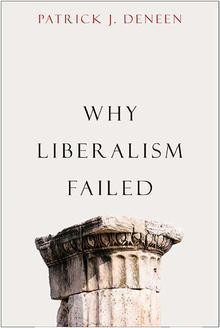Why Liberalism Failed - A Review
I think there are probably a half dozen people in the world that think things are about as good as they could be. They are probably either in a coma or eating ice cream at the moment. For the rest of us, it is pretty obvious that something stinks in the kingdom of Denmark.
In the United States and across the Western world, liberal democracies are teetering on the edge of populism. The levels of misery are climbing in areas of the United States as more and more people are dying “deaths of despair,” often by overdosing on opioids in an attempt to dull the ache inside.
Where did we go wrong? What happened to the home of the free and the brave?
For some, the growing sense of dis-ease fuels a call to return to some earlier state of supposed greatness. This is a call to turn back the clock to halcyon days when contentment was higher (in some circles) and the stressful influences of social isolation were much less prevalent. For others, the same conditions are cause for increasing centralized government control, increasing redistribution of wealth, and passing laws to make people conform to the sort of behaviors that are deemed beneficial by the people that really know. Both of these call for variations of a sort of social liberalism (distinct from progressivism). Patrick Deneen argues that the best remedy for what ails us is moving away from liberalism, because the populism and dis-ease we are experiencing is a feature, not a bug, of the liberal political order.
Although the meaning of the term “liberal” or “liberalism” has changed over the years and is often used to denote progressivism, liberalism is a broader political philosophy that includes both classical liberals (i.e., conservatives) and progressive liberals (i.e., progressives). As a definition of the term, Deneen writes, “Liberalism was premised upon the limitation of government and the liberation of the individual from arbitrary political control.” This led, in its early application, to a representative democracy in the United States with assurance of free speech, the freedom of religion, and robust property rights. In its early implementations, liberalism was supported by the premodern political order that still believed in virtue as a necessary and worthy human ideal.
For all the benefits of liberalism (and there are many), it has within it the seeds of its own demise. Liberalism lacks the ability to reproduce virtue, because its foundation lacks substance. Liberalism is something of a content-free philosophy. It functions more as an organizing framework for other substantive philosophies. However, this contentlessness quickly becomes its own content, much like Seinfeld, a show about nothing, had a strong satirical message that tended to deconstruct social norms. Just as Seinfeld worked because it borrowed the substance from the world and made it appear irrelevant, so liberalism has worked borrowing from the substance of other philosophies.
That’s all fine and well until there are no other philosophies broadly held by a culture that are strong enough to support liberalism. According to Deneen, that is what we are experiencing. Thus, we have an anti-culture that really serves as a reaction to whatever came before. We have a progression toward dis-integration of social structures to the point that even obvious realities like maleness and femaleness are up for debate, or, in truth, considered to be forms of violent oppression by an elite, but culturally powerful minority.
Deneen’s book is a bit jarring in its pessimism, but there were few points that I could find strong counter arguments. If anything, I think he may simply be a bit more negative about our chances of maintaining the goods of liberalism than is really warranted. Time will tell. I still think that Jonah Goldberg’s Suicide of the West may be the better path, where we push toward a more beneficent version of liberalism. It is, as Goldberg argues, very hard work, but I think it may still be the way to go.
Still, Deneen’s proposed path forward, which he does not bring up until the conclusion of the volume, is worth considering. He argues that we need to move away from liberalism to something new. He proposes three initial steps:
1. First, acknowledge the legitimate achievements of liberalism. There is no question that our material condition has benefited greatly from the advancement of philosophical liberalism, with the ability to move, to innovate, and to retain more of what we produce.
2. Second, he argues we must “outgrow the age of ideology.” This will require us to “focus on developing practices that foster new forms of culture, household economics, and polis life.” I think what this means in context is focus more on people than on big ideas and grand restructuring of the world.
3. Third, we must implement the first two steps, by building on and not abandoning the good things that have come before. This is the least clear of the three steps, but I think Deneen is calling for progress that does not try to begin de novo, as the Enlightenment project of liberalism. The hope is that we can use the positives of liberalism in combination with the treasures of ancient wisdom to forge a more humane future.
Why Liberalism Failed deserves to be read and the ongoing discussion that has spawned from Deneen’s work is worth the attention it has received. Nearly everyone agrees that something is wrong. The two main answers we have in the US in the DNC and GOP do not seem have anything like a realistic vision for future flourishing. A healthy conversation about what society ought to be and how it ought to be shaped is a necessary and worthy endeavor.











There’s no reason to doubt that Jesus was nailed to the cross. Ultimately, I trust what Scripture says about Jesus’s crucifixion because I also trust what it says about his resurrection. And that’s what we should be celebrating this week.